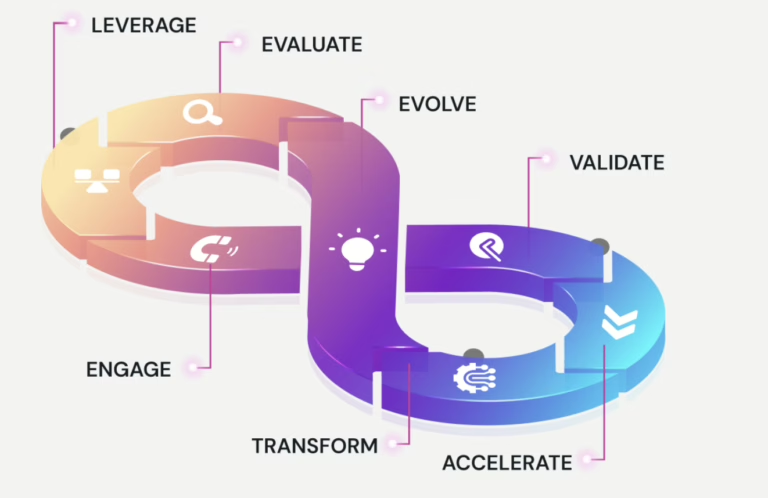The financial services industry is highly profitable, generating around $12.5T in annual revenue and approximately $2.3T in annual net profits, with an average profit margin of 18%. Despite its profitability, customer satisfaction in financial services, including insurance, has traditionally ranked low as compared to other industries.
Financial services organizations have consistently outperformed traditional organizations in this regard, with significantly higher customer loyalty scores.
Furthermore, the sector displays considerable growth potential, particularly within emerging markets. According to BCG reports, a staggering 1.5 billion adults globally do not have access to banking services, while an additional 2.8 billion are classified as underbanked, lacking access to credit cards. This demographic encompasses over half of the world’s population. Moreover, despite 89% of adults using mobile phones or smartphones, many still heavily rely on cash for major transactions. This significant untapped market represents a prime opportunity for fintech software development. Innovative solutions have the potential to bridge this gap by offering accessible and mobile-friendly financial services to these marginalized populations.
Therefore, let’s check the major trends that will be transforming the financial services industry this year –
AI-driven personalized financial services
Financial services are becoming highly personalized with AI and advanced analytics. Fintech firms are employing intelligent algorithms to analyze individual expenditure patterns, risk profiles, and investment preferences. This capability helps to provide tailored budgeting, saving, and investing recommendations that align with each individual’s unique preferences.
Some of the use cases are –
Personalized Financial Guidance: AI-driven assistants leverage individual data and financial objectives to offer personalized recommendations for investment strategies, savings plans, and financial management.
Insightful Data Analysis: Utilizing AI, even with incomplete data, enables the extraction of meaningful financial patterns, aiding in accurate forecasts and informed decision-making. These insights extend to predicting consumer preferences and facilitating targeted marketing approaches.
Virtual Financial Companions: AI-powered chatbots and assistants deliver round-the-clock personalized financial guidance, alleviating the workload on support teams. They assist users in tracking expenses, meeting financial goals, and monitoring spending habits efficiently.
Enhanced Compliance and Customer Interaction: Natural Language Processing (NLP) plays a pivotal role in ensuring regulatory compliance by scrutinizing documents and pinpointing potential issues. Additionally, NLP empowers chatbots to comprehend customer queries, furnishing precise responses, thereby streamlining client interaction and onboarding processes.
Robust Fraud Mitigation: AI monitors client behavior, spending habits, and location to detect suspicious activity and prevent fraud. This fintech trend is significant in today’s increasingly sophisticated cyber threat landscape.
Decentralized finance will go mainstream
The decentralized finance platforms that empower individuals to access financial services directly have become another prominent fintech trend. The DeFi initiatives will continue improving and diversifying their offerings, including lending, borrowing, and insurance services. As they transform, they are going to attract a broader audience and disrupt the conventional financial system. With this evolution, several use cases can be taken into consideration, such as – user-friendly wallets and platforms, solutions for investors seeking the safekeeping of their DeFi assets, and solutions that enable seamless transfers of assets that facilitate access to DeFi services for legacy financial institutions.
Improved security & authentication measures
In the upcoming year, 2024, a multifaceted approach to mobile banking apps and in-person transactions is poised for widespread adoption. Users can anticipate streamlined access to their accounts, enabling payments and transaction authorizations through simple touch, look, or voice commands. This advanced method enhances security, eliminating the reliance on traditional PINs and passwords.
The realm of fintech identity management is set to experience several significant trends in 2024. Notably, improvements in Single Sign-On (SSO) are expected, featuring enhanced security through multi-factor authentication and context-aware access controls, promising a more secure and user-centric experience.
Decentralized identity systems, leveraging blockchain technology for self-sovereign identities, offer users greater control over their data. Despite anticipated popularity, challenges related to scalability and regulation must be effectively addressed for wider adoption.
Cloud-based Identity-as-a-Service (IDaaS) solutions are projected to witness substantial growth, catering to the increasing migration of businesses to the cloud. IDaaS offers scalability, flexibility, and cost-efficiency, appealing to organizations across various sizes.
The role of regulatory bodies is pivotal in steering the evolution of biometric authentication. Striking a balance between user convenience and privacy remains paramount.
Sustainable Solutions
2024 will be a landmark for sustainability. The industry’s recent innovations have been largely driven by a commitment to reduce the global carbon footprint and mitigate existing environmental damage.
Some of the use cases are –
Environmentally friendly cryptocurrencies – the traditional cryptocurrency mining process uses a lot of energy; Bitcoin alone is estimated to consume electricity in a whole country like Thailand.
Due to this impact, Fintech leaders are turning to alternatives. Green cryptocurrencies like Chia, Nano, and Cardano use consensus mechanisms that help in minimizing energy consumption.
Ethereum and other green cryptocurrencies are based on proof-of-stake algorithms, which might help reduce energy consumption. Users stake their coins to verify transactions. Green goals can be achieved through pre-mining and carbon credits.
Digital wallets for reducing waste and emissions
Traditional checkout methods, such as cash and plastic credit cards, generate an average of 3.78g of CO2 per transaction. Approximately one-third of the environmental impact linked to debit card payments stems from greenhouse gas emissions due to energy consumption and transportation.
Opting for digital wallets presents an environmentally conscious payment alternative, reducing paper and plastic waste while offering multiple convenient features. The adoption of eco-friendly payment options and the uptake of mobile wallets are on the rise, significantly shaping modern FinTech services.
Beyond facilitating paperless transactions, eco-friendly digital wallets often operate using renewable energy sources and sustainable infrastructure. Some companies providing e-wallet services prioritize environmentally friendly initiatives and allocate a portion of their profits toward supporting environmental causes.
Conclusion
This year is going to witness transformations fueled by technological trends. Decentralized finance, with its disruptive potential, will expand its offerings and accessibility, attracting a wider audience and challenging traditional financial systems. Simultaneously, the integration of AI-driven personalized financial services promises tailored guidance, insightful data analysis, and virtual financial companionship, elevating user experiences while enhancing financial decision-making.
Additionally, a significant shift toward improved security measures and authentication methods, including the multifaceted approach to mobile banking and decentralized identity systems, forecasts a more secure and user-centric financial landscape. The convergence of sustainability efforts and fintech innovations also marks a noteworthy stride. As environmental consciousness rises, the adoption of eco-friendly cryptocurrencies and the use of digital wallets emerge as solutions, reducing waste and emissions in financial transactions.
The tech trends shaping the financial services industry in 2024 promise a more inclusive, secure, and sustainable future. The fusion of technological advancements with a commitment to addressing environmental concerns sets the stage for a transformative era where financial services evolve to meet the needs of an interconnected world.







